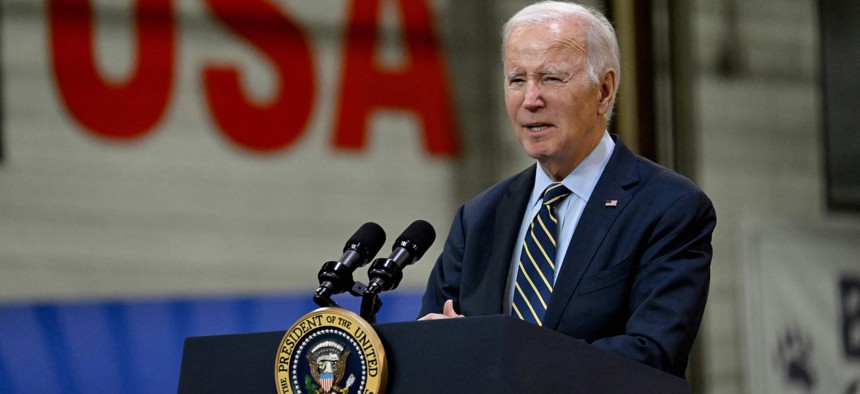Getting better deals for the government

President Biden speaks at an Amtrak facility in New Castle County, Del., on November 6, 2023 ANDREW CABALLERO-REYNOLDS/AFP via Getty Images
COMMENTARY | Steve Kelman explains that common sense has often had a tough time getting accepted in debates about procurement policy.
I have on occasion been critical of the Biden administration’s approach to procurement. I wrote in this space last April:
“I have in general been underwhelmed by the Biden administration's approach to management improvement in government. In the contracting area, where I have been interested for decades, the administration has stated it seeks ‘improvements in the federal acquisition system to strengthen the U.S. domestic manufacturing base, support American workers, lead by example toward sustainable climate solutions, and create opportunities for underserved communities.’ I have nothing against such goals, but there is something key missing from them—to deliver better value for taxpayers and agency missions through the procurement system.”
Given my past worries, I want to express happiness about the administration’s latest pronouncement on procurement. The Better Contracting Initiative unveiled last week “looks to leverage the size and scope of the federal enterprise to obtain lower prices on commonly used goods and services, including enterprisewide licensing deals on software.”
To a reader only casually familiar with procurement policy debates in the federal government, this statement probably seems like just normal common sense. Combining purchases, where appropriate, is a classic way of saving money both for us as individual consumers and for organizations that buy many goods and services. Everyone knows that you save money by buying a giant economy size rather than a single-serve package, or buying at wholesale rather than retail. Nobody ever gives you the admonition, “I can get it for you retail.”
Yet this common sense has often had a tough time getting accepted in debates about procurement policy. In certain circles, particularly among the small business procurement lobby, advocates rail against what they call “contract bundling” — translated into normal language, buying in bulk. For many years, there have been efforts on the Hill, often in connecting with Defense Department authorization bills, to prevent this practice. About a decade ago, a series of DOD authorization bills limited, though they never prohibited, contract consolidation.
These calls have happily become less frequent in recent years, my old friends Stan Soloway and Larry Allen, who both represent government contractors, agree. Both note that DOD has worked extensively over time to increase contracting opportunities for small businesses. Allen also told me that efforts against bundling have decreased because of “the emergence of other factors such as secure supply chains, increased cybersecurity requirements, and non-acquisition related socio-economic goals that are all expensive for small businesses to meet, but which are issues that are now higher on the importance list than they were.”
Given the history, the administration’s new statement on leveraging the government’s buying power to get better deals represents a welcome course correction for the administration’s procurement policies.
Taxpayers and agencies should welcome this.





